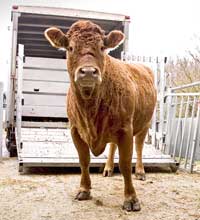Animal health proposals unveiled

Farmers must be given more say in animal health policies before they can be expected to pay more towards the cost of combating livestock disease, government advisors have warned.
The independent advisory group on responsibility and cost sharing published its recommendations to ministers on Monday (13 December).
The proposals rule out the idea of imposing an animal disease levy on farmers, warning that the disadvantages far outweigh any advantages. But they do recommend setting up a partnership board as a way forward for responsibility and cost sharing for animal health and welfare in England.
Improving the effectiveness and value for money of government policy and delivery was fundamental, said the group. A fresh start in animal health and welfare policy was vital so trust between farmers and DEFRA could be rebuilt and maintained, it warned.
Advisory group chairman Rosemary Radcliffe said group members had worked hard for over a year to develop their recommendations. The proposed partnership board offered an excellent opportunity for farmers to have an integral say in the development of government policy, she said. “Ministers, civil servants and animal keepers and their representative organisations will all need to adapt to new ways of working, but the benefits of doing this will in our view far outweigh the costs.”
The board would bring together key DEFRA officials with livestock industry representatives and others with wider interests in animal health and welfare. But its success would depend on appointing the best people – and on excellent communications with stakeholder groups, Ms Radcliffe warned.
If this was achieved, the goals of responsibility and cost sharing could be delivered with minimal bureaucracy and set-up costs. Unlike a non-departmental government body, the partnership board could be established quickly without any need for legislation. But it would still be an integral part of DEFRA’s decision-making processes. The board would be the sole source of departmental advice to ministers on all strategic animal health and welfare matters in England.
Only after credible arrangements for sharing responsibility had been established should decisions on further cost sharing be considered, said Ms Radcliffe. In the meantime, a full bottom-up value-for-money review should be undertaken of all government-funded activities relating to animal health and welfare. This review would build on the group’s existing work and look for new and innovative ways to deliver services, said Ms Radcliffe. Only then should the new board examine the scope for any changes to the fees and charges regime and compensation arrangements.
It should also undertake detailed work on disease control strategies, incentives and insurance arrangements involving private sector underwriters. The British Veterinary Association described the proposals as a commonsense approach to animal health and welfare.
BVA president Harvey Locke said he was particularly pleased that the group had ruled out any separation of animal health and welfare policy. “The BVA is also supportive of a strong voice for industry and the veterinary profession in policy making, as well as proposals that do not exclude any kept animals.
Ministers are expected to respond to the recommendations in February.
